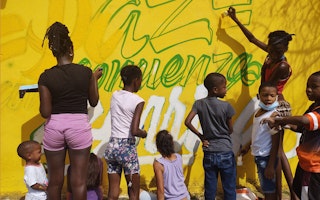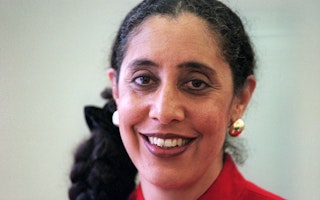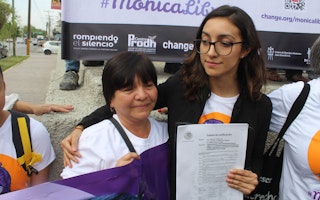Adam Culbreath: What It Takes to Be a Soros Justice Fellow
By Laura Brahm

What’s your professional background, and what drew you to working at the Open Society Foundations?
I’m a recovering lawyer, as the saying goes. Interestingly, my legal experience isn’t in criminal justice, which happens to be the focus of the Soros Justice Fellowships. Instead, I worked on issues like affordable housing, income supports, and access to health care—all things that might be considered peripheral to criminal justice reform but that are essential elements of safe, healthy, and strong communities (and that should be part of the conversation around criminal justice reform). I also have a background in youth development, as well as some exposure to the world of philanthropy.
Like many people here who’ve spent some amount of time in the field, I was attracted by the idea of working at a place that was willing to commit significant resources to issues that were important to me, professionally and personally. It’s a tremendous privilege—and somewhat humbling—to spend my days exposed to individuals and organizations that are the true leaders in the struggle for social justice, folks working all over the country on some of the toughest, most contentious and contested issues of the day.
Briefly describe the Soros Justice Fellowships. Why are they awarded? What do you hope to achieve via the program?
We’re a program that awards full-time fellowships to 15–20 individuals each year to implement innovative projects that advance the Open Society Foundations’ criminal justice reform priorities in the Unites States. We support lawyers, advocates, grassroots organizers, print and broadcast journalists, filmmakers, and other individuals with distinctive voices and perspectives. We fund people who are established leaders, with long and distinguished records of achievement. We also fund people who are just emerging as bright lights on the scene. And everything in between.
I believe that one person, with one idea, at the right time, under the right circumstances, can have a significant impact on the field. Since it’s never clear when an opportunity to move an issue or spark a debate or right a wrong might arise, grantmakers have to be fast-acting, flexible, and nimble. And they have to be willing to take chances. Fellowships are ideally suited for this, in my mind.
We support such a diversity of people doing such different things all over the country, so there are several things we hope to achieve through the program. Sometimes it’s about supporting someone who’s likely to be a future leader in a particular part of the country or on a particular issue. In other cases, it’s about a project that is likely to teach us some important lessons about an issue that’s been on our radar but that might not be a current area of real emphasis. Or it might be about investing in someone working on something that has a real chance for achieving an important policy victory.
But we hope that the cumulative effect over time—the program’s been around for over a decade—will be a strong and diverse network of people working on a whole range of criminal justice reform issues, coming at the work from different perspectives—litigation, public education, grassroots mobilization, investigative journalism, documentary film, etc. If there’s an important criminal justice reform issue out there, we want to be able to say that a Soros Justice Fellow has worked or is working on it.
What are some of the most important qualities you look for in an applicant?
I’d say, one, there should be real evidence of commitment to the specific subject matter of the project. There are plenty of capable, talented folks out there, but we’re looking for people whose past work, life experiences, and personal story show why this particular person is seeking a fellowship to do this particular project.
Second, we’re looking for applicants who’ll get things done. Being a fellow requires a great deal of initiative, creativity, and drive. And in the scheme of things, the fellowship period is pretty short—18 months for Advocacy, 12 months for Media. We want to know that we’re supporting people who’ll take full advantage of every moment under the fellowship and who’ll be focused on achieving the results that they say they’ll achieve—and who have track records that speak to these kinds of things.
And third, we’re looking for people who understand how the work they’re proposing fits into what others have done or are doing—not only in criminal justice reform, but also in related areas like education, housing, health, and employment. The truly new idea is pretty rare. But there are plenty of opportunities to build on the work of others, offer refinements, novel perspectives, etc. Really, it’s a matter of seeing how your work connects to a bigger picture. This kind of perspective is typically a sign, too, that someone’s a strategic thinker—and, in a very basic way, is paying attention to what others are up to. There are other qualities that are important, depending on the type of project someone’s proposing, but I’d say these are three that cut across most of the projects that receive serious consideration.
The strongest people and projects are, in many ways, inexorable—the work is going to happen, one way or the other. It simply has to happen. When we come across projects that hit upon an important and exciting issue, that are driven by passionate individuals with real connections to the issue, and that fill an obvious gap in the advocacy or media landscape, it’s pretty exciting.
Tell us about a fellow (past or present) whose work really amazes you.
One of the program’s real strengths is that it’s a big tent, so to speak. There’s room for all sorts of exciting approaches, stories, perspectives and the like. For example, just in my tenure here—I came on board in late 2007—we’ve supported people like Joshua Perry, a lawyer in New Orleans who, as a staff attorney at Orleans Public Defenders, experienced first-hand how front line trial attorneys, with caseloads more than double the national average, were too swamped with the day-to-day to take on a host of long-standing and deeply entrenched injustices in the city’s criminal courts.
Fighting against system-wide abuses takes time and resources. It also takes someone who understands the big picture. So, we awarded Josh a fellowship to coordinate a special litigation project to challenge issues such as the indiscriminate over-detention of people who’d been arrested, no matter how minor or insignificant the offense; the jailing of citizens for no better reason than they couldn’t pay a fine; and the refusal of public agencies to provide properly requested public documents. Josh has since moved over to Juvenile Regional Services of Louisiana, but he continues to work closely with Orleans Public Defenders; and the litigation project he set up through his fellowship remains in place.
Or take someone like Liane Rozzell, who’s building an organization of families, youth and community members who’ll be advocates for transforming Virginia’s juvenile justice system. Like lots of places around the country, Virginia’s juvenile justice system has a lot of problems. It locks up too many kids, sends too many kids through the adult system, and comes down hardest on kids of color. For Liane, her work isn’t about “doing good” or “giving back.” Instead, it’s about translating a very personal experience into something that connects and mobilizes others. You see, her son was locked up in one of the state’s juvenile prisons. Liane wasn’t a professional advocate or a policy person or anything like that. She was just trying to raise her family. But seeing what her son went through made her realize that something larger was happening, something that affects countless of families in ways that you can’t imagine. So, she quit her video production job, and devoted herself full-time to building this organization, this vision.
And it’s not just the advocates. We also support people like Nancy Mullane, an accomplished radio journalist and producer. Nancy is working on a project to tell the stories of people in California prisons who, despite serving life sentences that offer the possibility of parole and doing everything they possibly can while behind bars to show that they’ll be okay on the outside, are virtually assured of spending the rest of their lives locked up. It’s an important issue—there are nearly 30,000 people in this position in California alone. Nancy has managed to gain unprecedented access to the state’s prisons to be able to record these stories. She does remarkable work, both in terms of the issue she’s exploring, as well as in terms of her craft as a radio journalist—when you hear these stories, it hits you: here’s someone with a real talent for capturing the nuance of sound and voice.
I could go on and on. But these are just three of the individuals in our mix recently, all doing very different things.
In the run-up to the application deadline (November 3), what questions do you get asked the most frequently? And how do you answer?
Not surprisingly, people often want to know simply whether their project fits within our guidelines. Given that our priorities are relatively expansive, the answer is typically “yes.” However, it’s more than a question of fit alone. Fit will get you in the door. But applicants want to get in the door and to the table. This obviously requires a more careful analysis—something that isn’t possible outside our review of full proposals as part of our regular selection process. When reviewing full proposals, we look at things like, Is the applicant innovative, passionate and committed? Is she well-versed on the issue and current work taking place in the field? Will the project make a broad or deep impact on a local, regional or national level? If it’s a media project, does it have the potential to educate or influence people or have real utility for advocates on the ground? Are the goals, if achieved, likely to result in meaningful change? Will the project “add value” to a place, constituency, or field?
Another question that frequently comes up is whether we’ll support projects that primarily involve providing direct services to individuals. The answer ordinarily is “no.” Our thinking is that, since fellowship resources are limited, we want to have as much impact as possible. And although direct services obviously address vital and critical needs, we’re most interested in those projects that have the potential for being more than about getting a particular result for a specific client. For example, we’d like to see projects that target policies or practices that affect large numbers of people. Clearly, that’s a tall order for one person taking on one project for a relatively short period of time, but our fellows are a pretty ambitious lot.
Any other words of wisdom for prospective fellows?
Put yourself in our shoes. If you had the privilege of awarding 15 to 20 fellowships to people all over the country, to take on projects dealing with a variety of problems in the U.S. criminal justice system, how would you want to allocate those resources to have the greatest possible impact on the issues that matter? How would you distinguish among applicants in what is likely to be a large pool of dedicated, passionate, committed individuals? What would you think would truly set someone apart?
Do your homework. As I mentioned earlier, the truly new idea is rare. Your project should reflect an understanding of the work that has come before, as well as the work that’s happening right now on an issue. It should also make clear how your project fits into this landscape.
Finally, show yourself. Do everything possible to show how the project is a reflection of your passions, your experiences, and your commitment. After all, this is a program that funds individuals. Obviously, the quality of the project matters immensely to us, but we want to know that the project’s being driven by someone special. Fellowship applicants should not be widgets, interchangeable with one another.
If you have any questions for Adam about the program, feel free to leave them in the comments below.
Until August 2014, Laura Brahm was senior content strategist for the Open Society Foundations.


